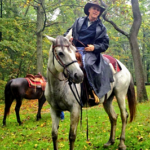Horse & Rider, February 2001
A girl of 10 lies sprawled across her bed, devouring the book before her. It’s The Black Stallion, an unlikely adventure story about a boy who tames a wild horse, and then rides it to victory in a great race. Sounds of children playing drift in the open window, but the girl doesn’t notice. She’s totally absorbed, even though she’s read the novel-and the more than a dozen others in the series as of the early 1960s- countless times already.

Fast forward almost 40 years. A journalist cracks open a new copy of an old book, one she hasn’t seen in decades. She pages through it, reliving the shipwreck that brings Alec and the Black together, the taming of the savage horse on a desert island, and the long quest to match the stallion’s astonishing speed against the leading racehorses of the day. At the pivotal moment, when the Black finally makes his move-despite an injured leg and a bungled start that leaves him 100 yards behind the others-she’s transfixed once again.and surprised to find herself weeping with emotion.
With a sudden spurt he bore down on Sun Raider. For a moment he hesitated as he came alongside. The crowd gasped as the Black’s ears went back and he bared his teeth. There was a movement on his back; his jockey’s hand rose and fell on the stallion’s side for the first time in the race. Into the lead the Black swept, past the cheering thousands-a step, a length, two lengths ahead-then the mighty giant plunged under the wire.
Oh, yes, she thinks. The magic is still there. Yes, indeed.
In October of this year, the world of children’s literature will celebrate the 60th anniversary of the publication of Walter Farley’s The Black Stallion, the book that begat a series that set a generation of youngsters dreaming about horses.
For the latest on the Black Stallion Literacy Project, click here to go to EquiSearch’s feature.
Sales of the 21 books in The Black Stallion/Island Stallion series have now topped 100 million worldwide. The novels have been published in nearly a dozen languages. The 1979 film, directed by Francis Ford Coppola, won an Academy Award, and has reached the platinum level on the Billboard chart of all-time best-selling videocassettes. The film’s sequel, The Black Stallion Returns, has passed the gold level of video sales; other films are in the works.
What makes the tale of The Black Stallion so enduringly popular? Come with us as we examine the phenomenon-past and present-of the equine the New York Times has called “the most famous fictional horse of the [20th] century.”







